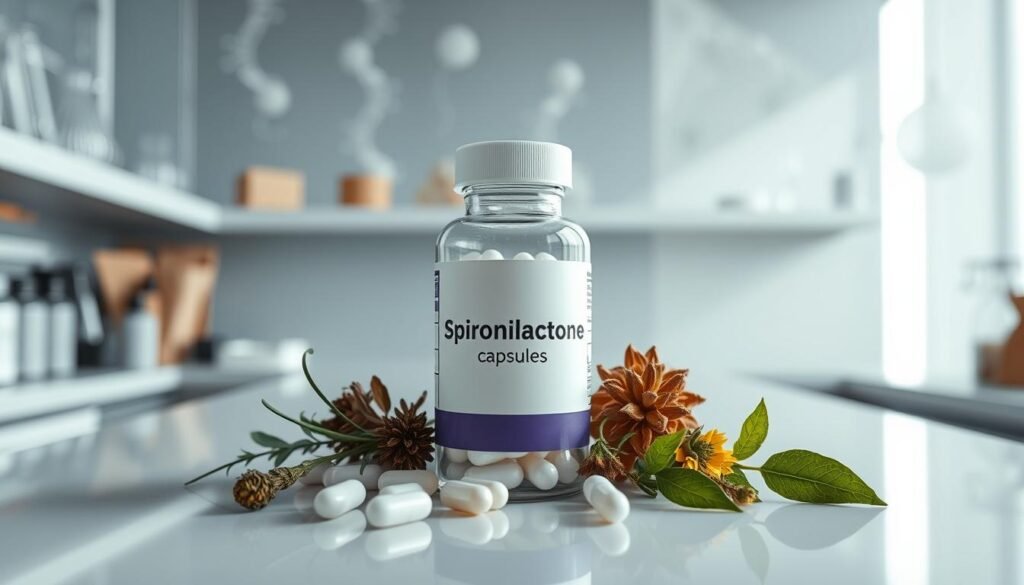Did you know over 1 in 10 women of reproductive age have Polycystic Ovary Syndrome (PCOS)? It’s not just about reproduction; it affects health deeply. PCOS leads to hormonal imbalances, causing hirsutism, acne, and irregular periods. In this light, Anti-Androgen Medications are vital. They fight off high androgen levels that worsen PCOS symptoms.
These medicines regulate periods and improve skin issues, boosting life quality for those with PCOS. Knowing how anti-androgens work is key in treating PCOS effectively. They form an essential part of comprehensive treatment plans. The effectiveness of these medications in managing PCOS is well-documented. More information can be found in recent studies.
Key Takeaways
- PCOS affects over 10% of women in their reproductive years.
- Anti-Androgen Medications are vital for managing excessive androgen effects.
- These medications help improve skin conditions and regulate menstrual cycles.
- Comprehensive treatment approaches are crucial for effective PCOS management.
- The integration of Anti-Androgen Medications can enhance overall quality of life.
Understanding PCOS and Its Symptoms
PCOS stands for polycystic ovary syndrome. It’s a common issue for women of childbearing age. This condition comes with various symptoms and problems. It can really affect a woman’s health and happiness. Knowing about PCOS is key to understanding its impact on life and health.
What is PCOS?
PCOS happens when a woman’s reproductive hormones are out of balance. This leads to several changes in the body. The exact reason why this happens isn’t known. However, genes and environment might influence it. Around 1 in 10 women in the U.S. are dealing with PCOS, making it a widespread hormonal disorder.
Common Symptoms of PCOS
The symptoms of PCOS can differ a lot from person to person. But, there are some usual ones that many face:
- Irregular menstrual cycles
- Weight gain
- Acne and oily skin
- Hirsutism (excessive hair growth on the face and body)
These can lead to other health issues like diabetes and heart problems. It’s important to spot and handle these PCOS symptoms. Doing so helps keep your health and life quality high.
The Role of Hormonal Imbalance in PCOS
Hormonal imbalance is a key issue in PCOS. It’s crucial for a woman’s health that her endocrine system works well. Hormones like estrogen and progesterone keep many body processes in check. But for those with PCOS, this balance is often upset. This leads to various symptoms and concerns.
How Hormones Affect Women’s Health
Hormones are important for our well-being. They impact not just our reproductive health but also our mood, weight, and how we metabolize food. When this balance is off, issues like PCOS can arise. Symptoms often include irregular periods, gaining weight, and mood swings. Managing these hormone imbalances can really help improve these issues and life quality.
Impact of Androgens on PCOS
Androgens, or male hormones, are usually lower in women. But in PCOS sufferers, androgen levels are higher. This can cause unwanted hair growth and acne. These issues affect more than just how one looks; they impact mental health too. It’s critical to understand how androgens play into hormonal imbalances. This is key for managing PCOS symptoms effectively.
| Hormones | Role in Women’s Health | Effect of Imbalance |
|---|---|---|
| Estrogen | Regulates menstrual cycle and supports reproductive health | Irregular periods, weight gain |
| Progesterone | Important for maintaining pregnancy and regulating mood | PMS symptoms, mood swings |
| Androgens | Influence hair growth and skin health | Hirsutism, acne outbreaks |
Anti-Androgen Medications: Mechanism of Action
Let’s understand how anti-androgen meds work. They are key in treating PCOS. They block or reduce androgens. This helps with issues like unwanted hair and acne. It shows powerful anti-androgen effects in those with hormone imbalances.
How Anti-Androgens Work
Drugs like spironolactone are great at stopping androgens. They do this by being androgen blockers. Androgens can’t bind to their receptors. This is crucial in easing symptoms from too much androgen. People often see less hair growth and clearer skin.
Comparison with Other Hormone Therapies
When we compare, we see big differences between anti-androgens and other therapies like birth control pills. Birth control works on estrogen and progesterone. It doesn’t target androgens. This info helps in making the best treatment plan for PCOS sufferers.
| Medication Type | Mechanism of Action | Primary Benefits |
|---|---|---|
| Anti-Androgen (e.g., Spironolactone) | Blocks androgen receptors and reduces production | Reduces hirsutism and acne |
| Birth Control Pills | Regulates estrogen and progesterone levels | Regularizes menstrual cycles, may reduce acne |
| GnRH Agonists | Suppresses overall hormone production | Reduces severe symptoms related to hormone excess |
To dive deeper into treatment options, think about a plan that includes lifestyle and medical steps. For more on managing PCOS, visit this resource.
Popular Anti-Androgen Medications
Many people looking into PCOS treatment find several well-known anti-androgen medications. These differ in how they work and their advantages. Some top picks include spironolactone, bicalutamide, cyproterone acetate, and finasteride.
Overview of Spironolactone
Spironolactone is a major player in tackling excess androgen, especially for PCOS in women. It’s a diuretic that blocks androgen receptors, reducing testosterone effects. It helps lessen acne and hirsutism, making it a preferred choice.
Meeting with healthcare providers regularly helps monitor any possible side effects.
Bicalutamide: Uses and Benefits
Bicalutamide works by stopping androgens at the receptor level. It’s used in hormone therapy for transgender women and certain cancers. This drug eases high testosterone symptoms, creating a better hormone balance.
For more details on its use, check this link.
Understanding Cyproterone Acetate
Cyproterone acetate works like bicalutamide, but it stops androgens on target tissues. It’s great for hirsutism and severe acne, effectively tackling PCOS symptoms. Also, as a progestin, it helps regulate menstrual cycles, aiding those with hormone issues.
Finasteride and Its Role
Finasteride, known for addressing male baldness, is now seen in women’s health, notably for PCOS. It lowers dihydrotestosterone (DHT) production, a strong androgen causing hair loss. Awareness of its benefits is growing among women dealing with hair thinning and hormonal concerns.

Benefits of Using Anti-Androgen Medications for PCOS
Anti-Androgen medications offer lots of benefits for PCOS symptoms. They greatly improve many aspects of life. These improvements are key, impacting your looks, hormones, and health.
Reduction of Acne and Hirsutism
Reducing acne and unwanted hair growth is a major plus of Anti-Androgens. High androgen levels in PCOS women cause these issues. Anti-androgens target these hormones, easing symptoms, and boosting confidence.
Improvement in Menstrual Regularity
They also make periods more regular. Irregular cycles cause stress and worry in PCOS sufferers. Anti-androgens help normalize hormones, leading to more consistent cycles. This makes health management easier.
Enhancing Fertility Potential
Improving fertility is another benefit. PCOS can make getting pregnant tough, but anti-androgens help regulate cycles and boost ovulation. Used with other treatments, they increase the chances of conceiving.
Potential Side Effects of Anti-Androgen Medications
Understanding the side effects of anti-androgen medications is crucial. These treatments bring big benefits. But, users must know about the possible downsides too. This helps in using medications safely and caring for your health better.
Common Side Effects to Watch For
People may face different anti-androgen side effects when on these drugs. Common issues include breast tenderness, fatigue, and electrolyte imbalances. Weight gain and mood changes are also reported.
Keeping an eye on these symptoms is important. It can help manage risks and make treatment more effective.
Long-Term Considerations
Using anti-androgen drugs for a long time requires attention to your health. It’s important to watch how they affect hormonal levels and bone strength. Seeing a doctor regularly is recommended to check on:
- Bone density shifts
- Liver function impacts
- Medicine dosage changes
- Hormonal balance reviews
Talking openly with health care experts is key. It helps ensure medication safety and boosts wellbeing throughout treatment.

GnRH Agonists as an Alternative Treatment
GnRH agonists are now key in treating PCOS differently. These drugs affect hormone release from the pituitary gland. This is vital for keeping hormones balanced. They can lower androgen levels, which typically rise in people with polycystic ovary syndrome (PCOS).
Understanding the Role of GnRH Agonists
GnRH agonists act like the natural hormone GnRH (gonadotropin-releasing hormone). They control hormone secretion in the body. This leads to a drop in ovarian hormone production. It helps those with high androgen levels feel better.
Benefits in PCOS Management
The use of GnRH agonists in PCOS care has many benefits:
- They can ease severe symptoms when usual treatments don’t work.
- They help make menstrual cycles more regular.
- They might improve the chances of getting pregnant for those with PCOS.
GnRH agonists allow for custom treatment plans in PCOS care. They provide a way to cater to the individual’s needs, showing hormone therapy’s diverse forms. This brings hope to those where standard medicines aren’t effective.
| Aspect | GnRH Agonists | Anti-Androgen Medications |
|---|---|---|
| Primary Function | Regulate hormone release | Block androgen effects |
| Symptom Coverage | Severe symptoms | General symptoms |
| Menstrual Regularity | Improved | Varied |
| Fertility Enhancement | Potentially | Limited |
As we learn more about PCOS, it’s essential to consider every treatment, including GnRH agonists. They are vital for managing PCOS well and improving health outcomes.
Combination Therapies for Optimal Results
Managing polycystic ovary syndrome (PCOS) often requires more than one method. Using meds that fight high male hormones with lifestyle upgrades can help a lot. Diet, exercise, and keeping a healthy weight are key along with handling hormones.
Integrating Anti-Androgen Medications with Lifestyle Changes
Anti-androgen medications work better with big lifestyle shifts. Losing weight can help a lot if you have PCOS. It makes insulin work better and lowers male hormone levels. Eating less refined carbs and exercising regularly are important steps.
- Adopting a Mediterranean-style diet full of fruits, veggies, and whole grains
- Doing cardio workouts three times a week
- Adding strength training to increase muscle
Mixing lifestyle changes and anti-androgen meds helps balance hormones and ease symptoms. This broad strategy is at the heart of current PCOS treatments.
Hormone Therapy Approaches
Combining hormone strategies with anti-androgens can help a lot. Oral birth control, which has estrogen and progestin, controls periods and fights male hormones. Metformin, another option, makes anti-androgen treatments work better. This two-pronged method can really improve PCOS care. It’s clear that using a mix of treatments is key, as shown in ongoing studies and this study.

| Therapy Type | Benefits | Considerations |
|---|---|---|
| Anti-Androgens | Reduces symptoms like acne and hirsutism | Requires monitoring for side effects |
| Lifestyle Changes | Improves insulin sensitivity and weight management | Requires commitment and consistency |
| Combined Oral Contraceptives | Regulates menstrual cycle and hormonal balance | May not suit all women |
| Insulin Sensitizers | Enhances effectiveness of anti-androgens | May have gastrointestinal side effects |
This table shows the good and the downsides of various PCOS treatments. Understanding different methods lets women with PCOS create a custom plan with their doctors.
Consultation and Professional Guidance
Dealing with PCOS can be tough because you need to make smart choices about medicines. It’s important to talk to a doctor who knows about PCOS. Endocrinologists and gynecologists have the know-how. They can suggest the right anti-androgen medicines that fit you best.
Importance of Medical Supervision
Having a doctor watch over your PCOS treatment is vital. Regular check-ups help keep track of your health. This way, your treatment can change if needed. It’s key for spotting any problems early and making sure your treatment fits your health and life.
Selecting the Right Medication
Choosing the right medicine is a big deal, and your doctor can really help. They look at your age, how severe your symptoms are, and your health. This helps them pick the best anti-androgen medicine for you. Each medicine works differently and has its own effects and side effects. Talking openly with your doctor helps you make smart choices for managing PCOS better.
| Medication | Target Symptoms | Common Considerations | Monitoring Requirements |
|---|---|---|---|
| Spironolactone | Acne, Hirsutism | Kidney function, Electrolytes | Regular blood tests |
| Finasteride | Hirsutism | Fertility considerations | Hormonal level checks |
| Cyproterone Acetate | Acne, Irregular periods | Risk of blood clots | Regular blood pressure monitoring |
| Bicalutamide | Hirsutism | Liver function | Liver function tests |
Getting personalized advice from doctors is crucial for handling PCOS well. Including healthcare experts in your treatment decisions helps you make choices. This leads to better health and life quality.
Conclusion
Anti-Androgen Medications are key in handling PCOS. They tackle acne, hirsutism, and irregular periods. These drugs improve overall health for PCOS patients. It shows how vital a complete, custom plan is. This should include drugs, lifestyle changes, and personal medical advice.
Patients should work closely with their doctors to make a plan that fits their needs. This team effort helps individuals with PCOS manage their health. It makes a better life possible. Managing PCOS is tough, but the right help can lead to success.
It’s crucial to know both the good and bad of Anti-Androgen Medications. There’s a growing focus on women’s health and making treatments that fit the person. This is good news in the fight against PCOS.